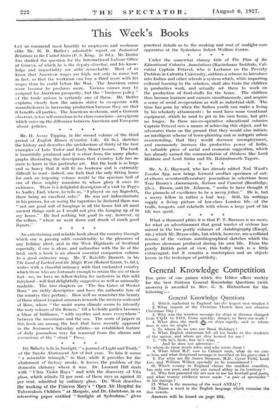Under the somewhat clumsy title of The Plan of the
Educational Colonies Associations (Kasimbazar Institute, Cal- cutta) Captain Petavel, who is Lecturer on the Poverty Problem in Calcutta University, outlines a scheme to introduce into Indian and other schools a system which, while imparting cultural learning to the scholars, shall also train the children in productive work, and actually set them to work on the production of food-stuffs for the home. The children thus become learners and earners simultaneously, and acquire a sense of social co-operation as well as industrial skill. The time has gone by when the Indian youth can make a living by his scholarly attainments ; he must have some vocational equipment, which he used to get in his own home, but gets . no longer. In these neo-co-operative educational colonies Captain Petavel sees a means of achieving this object, and he advocates them on the ground that they would also initiate an intelligent scheme of town-planning and so mitigate urban overcrowding, that they would decrease unemployment, and enormously increase the productive power of India. A valuable piece of social and economic suggestion, which has already earned the commendation of thinkers like Lord Haldane and Lord Sinha and Dr. Rabindranath Tagore.
* *






































 Previous page
Previous page